#Justifying evil deeds
Text
“Listen, now. On the other hand, you have fresh, young forces that are being wasted for lack of support, and that by the thousands, and that everywhere!
|
A hundred, a thousand good deeds and undertakings that could be arranged and set going by the money that old woman has doomed to the monastery!
|
Hundreds, maybe thousands of lives put right; dozens of families saved from destitution, from decay, from ruin, from depravity, from the venereal hospitals—all on her money.
|
Kill her and take her money, so that afterwards with its help you can devote yourself to the service of all mankind and the common cause: what do you think, wouldn’t thousands of good deeds make up for one tiny little crime? For one life, thousands of lives saved from decay and corruption. One death for hundreds of lives—it’s simple arithmetic!
|
And what does the life of this stupid, consumptive, and wicked old crone mean in the general balance?
|
No more than the life of a louse, a cockroach, and not even that much, because the old crone is harmful.
|
She’s eating up someone else’s life: the other day she got so angry that she bit Lizaveta’s finger; they almost had to cut it off!”
|
Dostoevsky, Fyodor/Crime and Punishment: A Novel in Six Parts with Epilogue/Vintage Classics/p. 68
#the truth#Fyodor Dostoevsky#russian literature#psychology#psychology before a kill#psychology during a kill#psychology after the kill#Justifying evil deeds#trade off is one evil deed for a 1000 good deeds#the failure of act utilitarianism as purely used in ethical evaluations#fyodor dostoevsky eventually has the main character give up and turn himself in because he could not move on from killing her#The failure of justifying murder of innocent blood with 1000 good deeds#Jesus dying on the cross and his resurrection show a powerful idea of redemption#murder is pure judgement where redemption does not exist because you can't redeem yourself because they are already dead#their are no justifications for murder#the danger of justification as a means to fulfill that of our confirmation biases#rule utilitarianism would have saved the main character from justifying the killing but not act utilitarianism#the flaws of redistribution and equality instead of equal opportunity#if you can justify degrading someone's existence you can just as easily justify strengthening someone's existence#the flaw in moral relativist thinking#moral objectivism supports humanity as a whole as equally valuable and brings room for reason unlike moral relativism
2 notes
·
View notes
Text
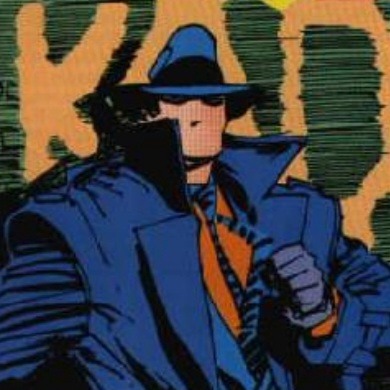
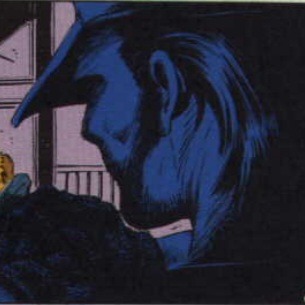
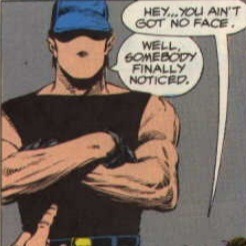
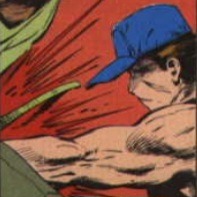
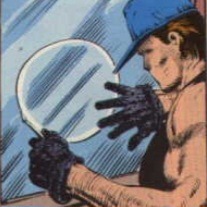
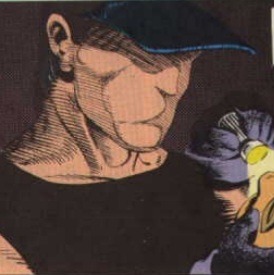
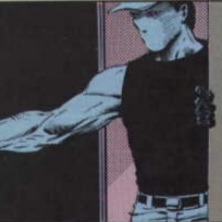
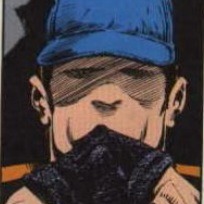
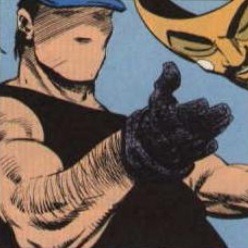
Questionable Images 1/2 - The Question #8 (1987)
#book club#the question#vic sage#dc comics#comics#questionable images#another one of my favorite issues#here you can see vic talk about second chances and get fucked up on drugs#also it contains at least two jokes about vic having no face. higher than there have been so far!#but seriously this issue is really fantastix#it shows you what someone who fights fire like fire is doing in the town of hub city#as well as discussing how 'innocence' can be subjective...#dr spaulding is one of my favorite one off antagonists. hes not cartoonishly evil or anything like a lot of the others.#you can see his motivations and you can see how his morals somehow justify this (while being hypocritical)#and yet you are able to look at it and decide how you feel about his actions & decide what it means when someone is 'innocent'#it forces you to ask yourself how much a person can do before they're irreparably guilty. and whether theres a balance to it.#100 good deeds might outweigh 100 bad deeds. or they don't. and every moment decides whether you're 'innocent' or not on its own.#and at the end you have to ask yourself whether spaulding deserved that. DID the punishment fit the crime? why him and not vic?#it brings up moral issues you maybe didn't think about before.#very very good issue... one i often think about.#WHY WONT TUMBLR LET ME MOVE THESE PICTURES AROUND IM GOING TO EXPLODE#no one is guilty except whoever at tumblr made this impossible
116 notes
·
View notes
Text
Every month, ATLA fandom from Twitter will bring the dumb discourse about Hama and the blood-bending technique, and the conversation going from "liberal views on revolution" to "it's a good thing to kill the civilians because they are colonizers"
So funny to see pro-violent revolution knuckleheads think they can keep the "good guy" label when committing the same crime against civilians like the colonizers in the name of retributions... They could have just said it's a necessary evil to kill the civilians of the colonizers, I would bite that, but no, let muck the civilians from the colonizing sides because of revenges and "we victims deserve that revenge by seeing the blood of unarmed civilians spilled to sate our hatred...We are still good guys, though"
Some of y'all just admit that you're bloodthirsty motherfuckers and only say pro-revolution shits for clout.
It makes sense why so many bitches in mdzs fandom are very okay with the masacre of Wens Renmants...
#I don't want to talk about ATLA too much#Like there are ways to criticize that episode with Hama without sounding like a homicidal freaks#Like blood-bending being inherently evil when it's just a tool that can do some good#Or the framing of Hama being more a psychopathic freak rather than a broken woman who was ruined by war and violent colonization#But no let justify her actions of harming the civilians#As if mucking the civilians who are likely just commoners would make the colonizers feel bad about their evil deeds in the past#ATLA#Hama#Every fandom always has the subset of bloodthirsty vengeful freaks that still delulu themselves they are the good guys
3 notes
·
View notes
Text


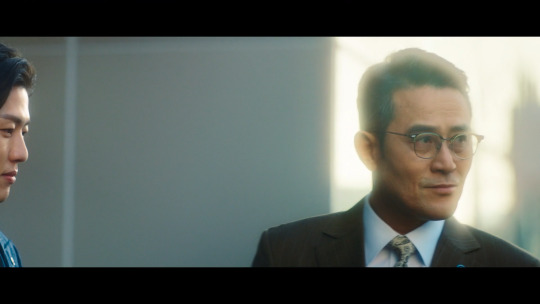
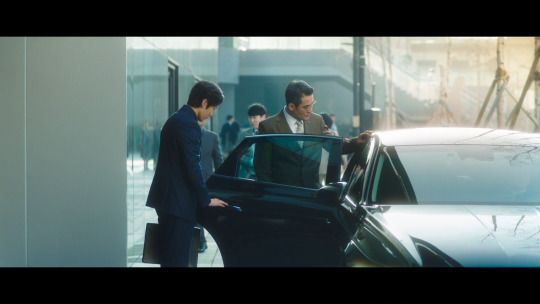
#look at them smiling at the thought of money#their characters are supposed to be hated but I know just how they are going to justify their evil deeds#mbc numbers#kdrama
2 notes
·
View notes
Text
sorry just let me infodump for one second, ok? ok.
epic the musical has me in a chokehold (spoilers ahead, PLEASE GO LISTEN if it seems like something you’d be into). and i was rethinking on the song Monster. specifically, the part where he begins to justify being cruel by comparing himself to the foes he’s faced. polyphemus, circe, poseidon (i 1000% think the order matters, ill get there in a second). and all of that just shows how his, like so many dangerously intelligent men in greek myths, big flaw is hubris. overwhelming hubris. he thinks that he’s allowed to be cruel because a cyclops, a witch, and a god are allowed to be cruel. he is just one of so many greeks who think they’re as good as — or even better than — the gods.
and there are hints of this throughout the entire show up until that point. he attempts (and succeeds in, after facing tragic losses) to deceive polyphemus by drugging him with the lotus fruit, believing that he is more powerful and intelligent than the cyclops. he tries to reason with poseidon after being asked by the sea god for an apology for blinding his son, but he does this in SUCH a manipulative way. poseidon tells him, “i won’t kill your men if you apologize to me,” and ody goes, “alright bet,” and gives him such an incredible non-apology (“poseidon, we meant no harm”). he is too fucking proud to apologize, and will attempt to MANIPULATE AN OLYMPIAN GOD in order to protect that pride. it’s wild.
he actually does successfully “defeat” circe, but only by literally begging her (“i beg you circe, grant us mercy”) to save his men and help him get home. he wins this fight because he puts his pride aside for once in his goddamn life, and rescues the scouting party because of it.
so here’s why the order matters in the song monster: he’s working himself up to comparing himself to an olympian. he doesn’t list his foes in chronological order. he lists them in amount of power and intelligence. if you just take what he’s saying at face value, he says “well, polyphemus was justified, and circe was justified, and poseidon was justified, then i must be, too!” but if you read deeper, he’s comparing his evil deeds to the evil deeds of people far more powerful and complicated and experienced than him.
in the thunder saga, both scylla and zeus manipulate this pride. scylla uses it to drop odysseus’ guard, inviting him to compare himself to her, and to find kinship with her, as they’re both “monsters” (“deep down, you know that we are the same”). and zeus tests his pride, to see how deep it fully goes, and possibly to reveal to odysseus himself how prideful he is. like poseidon and athena, zeus may be trying to teach odysseus a lesson, albeit significantly harsher than the latter. (“if i had to make you choose the lives of your men and crew or your own, why do i think they’d lose?”) it’s one of my favorite moments in that song, because it’s really just zeus pushing all of odysseus’ buttons to force him to make the choice that zeus wants him to make.
anyway that’s all. it’s just so cool and i have a lot of thinks!! i could make a whole essay just about the gods’ desire to teach odysseus but i’ll save that for another time.
#epic the musical#long post#thunder saga#epic the musical spoilers#epic the musical odysseus#epic the musical zeus#epic the musical circe#epic the musical polyphemus#epic the musical scylla#epic the musical analysis#rambles#mini essays
115 notes
·
View notes
Text
the thing is that i don't think that every story has to be morally upstanding, or that liking 'problematic' stories necessarily reflects on your morals in real life. i personally love tragedies, corruption arcs, evil characters committing evil deeds without a single ounce of regret, things i would be horrified by and always strive to work against in real life
the problem arises when the creator and audience, out of universe, talk about the corruption and evil like they are things to aspire to in real life. the entire point of 'make each other worse and be actual villains together' stories is that it's bad. it's in the word. i enjoy these narratives because they're spectacles to me; i don't want to be them. acting like they're something to want to live and celebrate and not something dark and horrific that's been twisted by an unreliable narrator takes out everything that makes them appealing to me. your 'let's be villains together' message is completely undercut if at every turn you're insisting, 'no actually the jedi were the villains all along and their fall was good and justified'
i don't even think that every story in the star wars universe has to be morally upstanding. i would welcome a well-written story from the perspective of a sith. but headland seems to think that turning to the dark side and being a sith feels good
in the star wars universe, being a sith doesn't feel good. this is established canon through every sith in every continuity. being a sith feels terrible. it's killing your own loved ones and regretting it and stewing in your own despair for twenty years because you're in too deep and this is all that's left for you. it's being abandoned by your own master and suffering in a literal trash heap for a decade. it's brainwashing your own brother who hauls you out because this is the only companionship you know, only for him to be killed by your master and you to be abandoned a second time. it's feeling empty and killing to fill the hole in yourself, but all that does is make you feel emptier and you will never feel satisfied no matter how much you kill, no matter if you kill a whole planet, because killing. doesn't. heal you. it's forcing yourself to stay alive through pain and hatred and anger even as your body is falling apart around you. it's betrayal and backstabbing at every turn. and always, always, always, the consequences of your actions catch up to you
so really this entire series is adding insult to injury to me
#midtalks#star wars#the acolyte critical#leslye headland critical#meta#sorry for impromptu love letter to the sith at the end but we were so robbed
131 notes
·
View notes
Text
Being right doesn’t mean you get to kill everyone else.
I’ve seen some griping that the writers of X-Men ‘97 “did Magneto dirty” by first showing how human / mutant coexistence was a delusion only to have Magnus go full genocidal tyrant. I think this, like the exchange between Rogue and Captain America has nuances that aren’t being appreciated, but I’ll grant the point that the demographic disparity and the destructive capabilities of the setting ensure that it doesn’t take broad support by non-mutants to enact a pogrom. Even before the revelation of Bastion, the idea of an attempt to kill as many mutants in one place as physically possible and ruin the illusion of safety wasn’t that far fetched: with or without the support and sanction of major world governments.
That Magneto would respond to the Genosha massacre with disproportionate force, and let’s call it what it is: killing humanity including quite a lot of mutants, is not the writers turning on Magneto. It’s who Magneto is in the animated series and at the moment in comic lore it’s based on. Who Magneto is is a mutant supremacist. Separation from Sapiens was never just about safety. Magneto wanted to build a parallel culture. Not for the sake of creating a culture and the beauty of creative endeavors but because of mutant chauvinism.
Because the setting is what it is, Charles the assimilationist is doomed. If the rubric for success is mutant safety and equality across the board, then it’s simply unachievable because tiny cabals of madmen can cobble together salvaged alien tech, secrets from the future, and knock off Stark tech to unleash horror that is obscenely difficult to prevent and doesn’t require widespread societal consent.
Charles chooses not to blame the people just trying to live day to day for the actions of hate filled mad scientists and lynchers.
Magneto blames the masses for not recognizing and stopping the threat in their midst, sees their inaction as complicity, and even if they are blameless then they are camouflage within which existential threats to mutants conceal themselves and if Magneto has to burn down the whole village or planet to deny genocidal schemers their cover, that’s what he’ll do. He’ll kill as many non-mutants as it takes to feel safe because he did not value their lives prior to Genosha, did not feel they valued mutant lives, and he has always viewed mutant lives as more valuable. Genosha ratcheted that up to genocidal rage.
Revolutionary, terrorist, oppressed, and oppressor are not static categories. Real life figures and fictional characters can slide between them very easily because monsters can make valid points and victims can do monstrous things. A correct observation about society doesn’t justify the monster’s darkest desires and suffering doesn’t make evil deeds justified.
That’s the point. That’s always been the point of X-Men. It’s not cops and robbers, bigots vs good people, it’s the struggle of everyone not to judge everyone else by the worst thing a member of the other group has ever done. Magneto and Bastion are the faces of giving in to rage and fear. Succumbing to the easy moral certainty of collective punishment and of the rationalizations provided by their respective supremacies. They always were. Even when they were making sense. Especially when they were making sense.
Epilogue: (Tolerance is Extinction pt 3 spoilers)
It’s never too late though to step off the path of the tyrant. Better early but late is better than never.
#magneto#x men 97 spoilers#x men the animated series#x men 97#magneto was right#xavier#collective punishment#seven billion eyes for an eye makes us all blind#only a sith deals in absolutes#erik lehnsherr
110 notes
·
View notes
Text
It never ceases to amaze me about how many different dehumanizing labels Dream is cast in. The tyrant, the green boy, the bad guy, the wrong’un, the villain, a psycho, psychopath (which tbh are already rather kinda extreme for his supposed crimes especially at the beginning when they started). But then they go further, calling him a snake thing, pure evil, a monster [clip], a freaking ghoul [clip], even to the point of calling him Lucifer in the finale - The Biblical incarnate of evil [clip].
And what’s really interesting is the inconsistency in which Dream reacts - because on one hand he should stand up for himself, but on the other maybe he should just lean into it and maybe they’ll leave him alone. Maybe the fear and label can be his defense instead of their offense. And that gives him control over it, turns him from the victim to the victor.
In the disc confrontation, Tommy calls him pure evil and asks “how do you sleep at night”, to which he responds “just fine” [clip] {oddly, directly contradicting his comment to Techno about no sleeping btw lol…}. Later, he talks about building the prison with a “little bit of evil” but then counters Tommy’s accusation of calling him evil again with “evil is in the eye of the beholder” and “you’re evil to me” [clip].
In the finale, towards the end, Tommy talks about how he saw Dream as nothing but The villain but that isn’t true, and surprisingly Dream disagrees by saying “I am. I tortured you” [clip] {also contradicting what he says to Sam in Daedalus…}. Which is interesting. In the finale, he also makes statements like ‘we can’t because we’re soo evil’ and “we have done plenty of evil evil things” [clip] (which Punz actually counters with “not for no reason.”) But in instances when they call him a psycho and psychopath he has a different reaction saying “huh, I mean, I wouldn’t say that,” [clip] “I’m not a psycho. Everything I do is deliberate” [clip] and, in the finale, “you guys are psychos. You broke in and tried—and killed me in my own house—the prison.” [clip]
One of the keys here I think is the distinction of having reasons - he’s not evil for kicks, he has a reason and motive and logic behind it. Something, in the finale, he questions whether Tommy has, first because he broke in and killed him unfounded and then towards the end of the stream asking about why he constantly steals and griefs and stuff, “why are you trying to ruin everything all the time.” [clip] - What was your reason? Because that mattered to Dream, someone can do evil things but they have their reasons, it’s when they don’t that they are more so truly evil.
He may have done evil things, he may even be the villain, but in his mind he’s not a psycho or pure evil, or a monster because he has reasons, there is a reason he did the things he did, there is a reason he ended up here. Not that those make his deeds justified and less evil (like Sam and Quackity more so believe) but that just makes him a person, who sure does evil, but also feels, and has reasons, desires, and motivations…etc. Just like everyone else. He doesn’t even see Quackity, who confessed to being sadistic and spent months torturing him, as pure evil or even a psychopath instead saying sarcastically in Daedalus, “like Quackity ‘cause he’s full of feelings… He’s totally not a sociopath…” because that distinction between sociopath and psychopath in Dream’s mind is important. Quackity is a bad person but he isn’t the embodiment of evil, he’s just a person who did evil things.
During the first war, Wilbur calls him a little lizard snake thing, to which Dream responds “I’m powerful” [clip]. Which is strange and kinda sad to me that despite being called an actual animal(s), one more importantly often representing evil like Lucifer the snake, he doesn’t counteract it. Maybe because he’s tired of Wilbur calling him similar dehumanizing terms or tired of arguing with Wilbur in general, since everyone believes him anyways. Regardless, he instead rephrases Wilbur’s words - maybe I am a lizard or a snake but you better not step on me because I am venomous and powerful. Which aligns pretty well with his monologue [transcript] where he talks about “Do snakes just bite?” or is there a reason. Because maybe he can’t change Wilbur and Tommy’s metaphor and maybe he can’t change the label of evil despite his attempts because everyone believes them instead, but maybe he can try and use their own words to defend himself. Maybe then they’ll see him as an actual person. {or not…}
#i hope this makes sense I’m not sure I did a good job expressing what I mean but I tried… this has been on my mind for a while#dsmp#c!dream#dreblr#dream smp#dsmp analysis#no one does it like c!dream#dsmpblr#dsmp dream#pandora's vault#did someone order an essay?#this is fine#aghdbnabdbbd god I’m sorry it just… how is he the bully again? heh?… like damn talk about name calling#no lie when Tommy called Dream Lucifer I laughed out loud before class in a college class room and got stares XD LOL… like bruh for real?#dsmp lore#snake monologue#some snakes just bite do you do I? not even once?……
123 notes
·
View notes
Text
disappointed but not surprised that people are so wildly missing the point when it comes to Ryan in the finale. y'all seriously just hate kids/teens.
like his father, Ryan has been a means to an end his entire life. raised in captivity. Grace's onslaught of Homelander's horrible deeds (which Ryan doesn't even get a SECOND to reconcile with) followed by her threat of SEDATION AND IMPRISONMENT unless he immediately agrees to murdering his last living family member (after he JUST gave a televised speech on the importance of family to him) was such a colossally stupid fumble it's difficult to believe they actually wrote it. unlike Butcher, Grace doesn't have the excuse of a suped up tumor eating her brain.
also, for those saying that Ryan is evil now because he killed Grace/didn't react to her death... did y'all forget Koy? really think about those two scenes side by side. Ryan shoved Koy under less intense duress and accidentally splattered him against a wall 50ft away. He didn't react then, either, because he shuts down during traumatic events. the very next scene is him sobbing in the penthouse over what he did.
Ryan shoved Grace under immense duress and broke her neck on a wall 10ft away. his reaction was muted. he shut down. i honestly don't think Ryan was trying to kill her, but he did act in self-defense.
either way, acting like the actions of a scared 12 year old justify Butcher giving control of his body to a genocidal tumor in his head is actual lunacy.
94 notes
·
View notes
Note
One thing about the Jackson films that bothers me deeply is that they are uncritically upheld as being full of "positive masculinity." Excuse me? This is the series that has Faramir ordering his men to beat Gollum, Aragorn cutting off the Mouth's head, & Gandalf beating up Denethor on multiple occasions (& kicking him into the pyre!). Sam's meanness toward Gollum, while understandable, is never questioned as it is in the book. Frodo is delusional to pity Gollum. Killing is fun, & mercy is silly.
Belatedly, I do agree. I get that the Anglophone media landscape can feel so saturated by absurdly reductive representations of masculinity that what the films do inherit from Tolkien in terms of emotional expression, friendship etc can feel revolutionary. But the films make a lot of minor and major adjustments to transform the story's visions of masculinity to something more conventional and particularly more violent in a way that is often endorsed by the narrative, or at least framed as an understandable if unfortunate exigency of war.
I once pointed out that Aragorn killing the Mouth of Sauron, an ambassador—however distasteful—is something that essentially operates on the worst kind of superhero logic, a sort of good vs evil righteousness-justifies-the-means thing. It's really glaring when based on a book where the character closest to the author is like "it's one thing, however regrettable, to fight to the death to defend ourselves and our people, but morally, evil deeds beyond self-defense cannot be justified by a righteous cause, not even lying to an orc."
Tolkien's version of the Mouth is an evil Númenórean sorcerer who, while he cannot really contend with Aragorn in a battle of wills, is nevertheless a person of the same kind and general capabilities who chose to serve Sauron. The way that the films use design to literally dehumanize the Mouth, to wholly distance him from the heroes he's literally akin to, and justify straight-up killing him although he poses no personal threat, because he's ugly and evil and (evilly) taunting them so they're mad and it's cool—yeah. It's not really that far removed from Gandalf clobbering Denethor being framed as a bit comedic and a bit cathartic, and seems part of a pervasive ethos of the films that seems to have completely fallen out of discussion of them.
I think we especially see this with the handling of not just my main faves, but Frodo, who really suffers in this more conventionally masculine framework. I often felt like the films want the real protagonists to be Aragorn and (to an extent) Sam, and Frodo feels a bit like dead weight from fairly early on. Adorable dead weight, but still, Tolkien's Frodo especially feels like a challenge to this kind of narrative ethos that the films are just not really up to handling.
It's not that everything about masculinity in the films is Terrible Actually, but I do think there are some unfortunate patterns like the ones you mention. And I'm constantly being recommended videos and posts about Aragorn (or others, but mostly Aragorn) as this unproblematic ideal of masculinity where I'm just ... yeah, no. He is interesting to me, including in the context of masculinity specifically, but I absolutely cannot buy the ideal positive masculinity thing.
#anon replies#respuestas#pj critical#anghraine rants#legendarium blogging#legendarium fanwank#the mouth of sauron#gender blogging#jewel of the seashore#aragorn critical#(but specifically film aragorn)#frodo baggins
95 notes
·
View notes
Text
But no; that’s not the way it is! To do evil a human being must first of all believe that what he’s doing is good, or else that it’s a well-considered act in conformity with natural law.
|
Fortunately, it is in the nature of the human being to seek a justification for his actions.
|
Macbeth’s self-justifications were feeble—and his conscience devoured him. Yes, even Iago was a little lamb too. The imagination and the spiritual strength of Shakespeare’s evildoers stopped short at a dozen corpses. Because they had no ideology.
|
Ideology—that is what gives evildoing its long-sought justification and gives the evildoer the necessary steadfastness and determination.
|
That is the social theory which helps to make his acts seem good instead of bad in his own and others’ eyes, so that he won’t hear reproaches and curses but will receive praise and honors.
|
That was how the agents of the Inquisition fortified their wills: by invoking Christianity; the conquerors of foreign lands, by extolling the grandeur of their Motherland; the colonizers, by civilization; the Nazis, by race; and the Jacobins (early and late), by equality, brotherhood, and the happiness of future generations.
|
Thanks to ideology, the twentieth century was fated to experience evildoing on a scale calculated in the millions. This cannot be denied, nor passed over, nor suppressed.
|
How, then, do we dare insist that evildoers do not exist? And who was it that destroyed these millions?
|
Without evildoers there would have been no Archipelago.
|
Solzhenitsyn, Aleksandr. The Gulag Archipelago [Volume 1]: An Experiment in Literary Investigation (pp. 173-174)
#the truth#ideology leaves no room for reason#justifying evil deeds#appeasing the collective to survive and living the lie as a form of self-preservation#tyranny feeds on lies#justification is to convince ones own conscience that what he is doing is right when it is wrong#hitler did this when he justified anti-semitism in Mein Kampf#tyranny's fall when the truth comes out and the collective experience the domino effect#the truth will set you free#equal opportunity is better for society#judgement is permanent condemnation where second chances come from redemption#a person who fully believes that their way is the way or no way is an ideologue and have made up their minds#abandon ideology#jordan peterson#rule 7#12 rules for life: an antidote to chaos
1 note
·
View note
Text
The beauty of QuanYin is that they have all the things that make HuaLian so good, but instead of bringing them together, it teared them appart.
I am talking about faith.
The things is, half of the ship is an autistic guy who's extremely good at one thing (kicking ass) and often gets infantilized by other characters or treated as if he's stupid, just for ignoring social niceties and refusing to entertain the idea that the only person who's shown him kindness is actually an evil lying snake who always secretly hated him.
And the other half of the ship is a guy who's main goal was always to just be a good person AND kick ass, but who's also always been an overachiever, so he wants to be Perfect at being kind and aims to ascend as a Martial God. His standards for himself are so high, he believes that thinking unkind thoughts means he failed (got a bad grade at being good), and doesn't understand why the man who only cares and understand actions, facts, and spoken words would believe him to be a Perfectly Kind person.
Because Yin Yu not only was outwardly kind to Quan Yizhen, but he also always tried to get others to be good to him as well. What's more, he didn't start resenting or thinking badly of Quan Yizhen until their ascension, and even then he never took it out on Quan Yizhen. Until he snapped at the worst possible moment.
Quan Yizhen knows Yin Yu is the sort of person that would always choose to do the right thing, no matter how difficult. So, if Yin Yu ever chose to hurt him, then either it must've been a misunderstanding, or he must have had a good reason. Because for Quan Yizhen, if there was anybody in the world he could trust, it was Yin Yu.
And Yin Yu, who's set unachievable standars for himself, feels that resenting someone who's blameless makes him awful and unworthy, and not merely human and flawed. And having Quan Yizhen see him as the man Yin Yu wants to be, but actually isn't, hurts him deeply, because he's not good or kind, he's petty and jealous. I feel he must have been terrified of disappointing Quan Yizhen, which he probably saw as an unavoidable outcome now that his shidi had the opportunity to truly shine in heavens
And it's not only Quan Yizhen believing Yin Yu to be perfect (which he doesn't, but I'll get to that later) but it's also Yin Yu believing Quan Yizhen is perfect. He's everything he wants to be, a true Martial God. And whatever flaw makes Quan Yizhen so unpalatable to others, Yin Yu sees them as unavoidable of being Quan Yizhen. Not good or bad, but expected, justifiable. (Can you really get angry at the sun if it burns you, how can you blame a bee for stinging you? Did you really expect you wouldn't get wet walking unprotected in the pouring rain.)
If Quan Yizhen is arrogant and tactless it's because he's naturally strong and honest. Quan Yizhen's bluntness means he's not two faced (like Yin Yu), it doesn't matter that Quan Yizhen can't read the room, because Quan Yizhen is above caring how he comes across to others (like Yin Yu does), if you think Quan Yizhen is annoying then that's not his fault, it's yours for not being as good as he is (Yin Yu sometimes finds him annoying).
QuanYin parallels HuaLian not only in the devotion, tirelessly searching, ghost/god relationship, but in the "unconditional belief in the other" more so even, because they had more time spent together getting to know each other. This faith wasn't built on sacrifices, on saving lives, on deeds of decisive righteousness.
This faith was built on years of growing up together.
Quan Yizhen believes in Yin Yu, because he knows Yin Yu will always choose to do the right thing. Yin Yu believes in Quan Yizhen, because he knows Quan Yizhen is as honest as he is loyal. They see the best in the other and know that it's fact (and it is!) but at the same time, that certainty hurt them both in a way it never did hualian. With Hua Cheng and Xie Lian, that unconditional faith meant salvation. To Quan Yizhen and Yin Yu, it led to them falling apart.
Quan Yizhen knows Yin Yu is good, because Yin Yu always chooses to do good things. Yin Yu thinks himself to be a liar and knows Quan Yizhen thinks Yin Yu is good, because Quan Yizhen would never lie. Because Yin Yu will always want to be good, he won't admit to Quan Yizhen his steadfast belief in him hurts him, because it would mean admitting just how small and petty he is, and it could lead to Quan Yizhen seeing Yin Yu's true self, and as Quan Yizhen is frank to a painful degree, he would immediately let him know how disappointed he is. And as Quan Yizhen is so honest, he literally calls it as he sees it. If Quan Yizhen sees Yin Yu as not enough, it means Yin Yu is not enough. Quan Yizhen is not to blame for Yin Yu's flaws, and so the right thing to do (for Quan Yizhen) is to keep being patient and kind, and not take out his own frustrations on a person who would never willingly hurt him. To keep Quan Yizhen seeing Yin Yu as perfect.
Their faith in the other keeps them apart. And this is because unlike with Hua Cheng and Xie Lian, they didn't start as god and believer, but as martial brothers of the same sect, who eventually reached divinity, and held for the other a certainty of righteousness only the most devoted would hold for a god.
And the sad thing is that they were both right. But the things that make someone good for one of them, would not cut it for the other.
Yin Yu thinks, if my actions are good but hide resentment and hate, then they aren't good at all. They're fake, and so, worthless.
Quan Yizhen thinks, if my actions hurt others even when there was only love and good intentions behind them, then what good are they? They're worthless.
Yin Yu ends up hating Quan Yizhen, but not as Jian Yu or the other gods or disciples hated him, just for being as he was. Yin Yu hates Quan Yizhen because Quan Yizhen turned him into the sort of person he never wanted to be. He resents him because Quan Yizhen shone so bright Yin Yu realized he was a candle flame under daylight. Because Quan Yizhen was good in a way Yin Yu would never be, plagued with envy and not a lick of talent.
Yin Yu doesn't actually blame Quan Yizhen for his downfall, he blames Quan Yizhen for leading Yin Yu to cause it. Yin Yu hates Quan Yizhen because he makes Yin Yu hate himself. And, in the end, Yin Yu will always hate himself more than he could ever hate Quan Yizhen. Yin Yu hates himself, because he hates someone he loves. He hated himself because he couldn't understand how someone could ever want to hurt Quan Yizhen, and then Yin Yu hurt him in the worst way possible. The moment Yin Yu lost control, his ugly inner self spilled out. Yin Yu hurt someone good, someone who never deserved to be hurt, and besides that dares resent him for showing Yin Yu how rotten he was inside. Which makes Yin Yu hate himself further, because now he's become the sort of person he always hated the most. And even at the end, as he died for Quan Yizhen, he could not let go of his resentment. He just couldn't let it go.
There's no end to it. It's self fueling and self fulfilling.
On his part, Quan Yizhen would never blame Yin Yu. He would never hate him.
Let's look at this through a more personal lent. I know many people, especially neurodivergent people, struggle with the constant anxiety of your friends and family secretly hating you (I know I do). Finding out that someone you thought was your friend actually couldn't stand you, would make you feel cheated, betrayed. And most likely, it would lead you to believe this was your fault. If your friend hated you, it's because you're unlovable (by the way, that's not how it works, but it is how it makes people feel).
Now, people never cared about Quan Yizhen's feelings. They would talk badly about him with no regard if he was listening, would be hostile if not patronizing. Would openly resent him for things he couldn't understand, blame him for things out of his control (for example, blatant favoritism from his teachers).
But.
There was always someone who cared about Quan Yizhen's feelings. Who never spoke badly of him. Who always admonished the people who patronized him or blamed him, even if Quan Yizhen was not around to hear him defend him. Who actually got into trouble by taking responsibility for Quan Yizhen's actions, repeatedly. Who always took Quan Yizhen's side, who saw talent in him when others only saw a dirty street rat. Someone who patiently reassured him that if others thought Quan Yizhen was annoying, it was their fault for getting annoyed, and not Yizhen's.
Someone who, when given the chance to leave him behind in a way nobody would blink twice at, brought him along and kept him by his side. Someone who chose him time and time again.
Quan Yizhen did have an inkling that he sometimes annoyed Yin Yu, and was fully aware that he got him into trouble (Jian Yu was never shy when it came to shouting just how much Quan Yizhen was dragging Yin Yu down). And despite all of that, Yin Yu stood by him and cared for him.
There was a time he knew Yin Yu loved him, and if Yin Yu didn't love him at least he would never hurt him, he would never let others hurt him.
And then, suddenly, Yin Yu tried to kill him. In strange, extreme circumstances: right after Quan Yizhen had brutally and unwillingly murdered a number of people, as he was wearing a cursed garment that forced him to do anything Yin Yu told him to, he shouted at Quan Yizhen to kill himself.
It was a series of events that made no sense in the eyes of someone who knew Yin Yu as well as Quan Yizhen did.
So it was either a huge misunderstanding, or Quan Yizhen finally fucked up so bad he became unlovable in the eyes of the only person who mattered.
And now everybody in heaven and earth spoke horribly of the only person who ever cared for Quan Yizhen. The people who claimed to follow and worship Quan Yizhen put on plays meant to humiliate Yin Yu. Others expected him to agree that Yin Yu was a liar, a jealous two-faced snake.
To Quan Yizhen, if they were right ( they weren't) and Yin Yu was a liar who always secretly hated him, then that meant nobody had ever loved Quan Yizhen. And if they were wrong (they were) then it meant Quan Yizhen hurt Yin Yu so badly, did something so awful, the only choice Yin Yu had, the only right choice at the moment, was to make Quan Yizhen kill himself.
Or, it was all a big misunderstanding (hopefully).
Quan Yizhen doesn't think Yin Yu is perfect, he doesn't want him to be either. All he wants is to be good for Yin Yu, to Yin Yu. He loves Yin Yu just as he is.
Yin Yu already believes Quan Yizhen is good, and to, and for Yin Yu. Is Yin Yu who is bad. Yin Yu who's unlovable.
Hua Cheng had faith in Xie Lian's inherent goodness. When Xie Lian stopped believing in himself, Hua Cheng's faith and unconditional love saved him.
But Hua Cheng never saw himself as an equal, just as a stepping stone, the incense in Xie Lian's altar. He loved and worshipped him, and he was content to see him safe and happy. And when Xie Lian saw him as someone deserving of love, even if Hua Cheng didn't believe it himself, he believed in Xie Lian
Quan Yizhen and Yin Yu wanted to be equals, they wanted to stand side by side. And to achieve said equality, they set standards to strive for, based on the way they saw the other. But they would never reach their goals together, because they set them in opposite directions.
Had they started as god and devotee, then it would've played similarly as HuaLian did: I am worthy because you believe I'm worthy. I am lovable because you love me. I'm good because you think I'm good. I can do anything because you trust me.
For QuanYin, though, it went: I am unworthy because I'm not like you. I am unlovable because I can't love myself through your eyes. I'm not good because I'm not good the way you are. Please don't trust me, I'll disappoint you. I'll let you down, I'll let you down, I'll let you down.
Yin Yu could not stand the idea of Quan Yizhen secretly hating him, so he hid to never be faced with it. Quan Yizhen would gladly take Yin Yu hating his guts, as long as he hated him within arm's reach.
Miscommunication caused by knowing each other so well, they were convinced they could not miscommunicate.
Self loathing born out of loving the things that made the other hate themselves.
But since their inner turmoil and personal struggles manifest in two clowns running in circles, people tend to, understandably, overlook them in favor of the considerably more dramatic BeefLeaf, or the outwardly antagonistic FengQing —both ships counting with further on-text development, higher stakes, and heavier emotional baggage than our humble, relatable QuanYin.
#THIS IS LONG#quanyin#yin yu#quan yizhen#tgcf#welcome to my quanyin agenda#I needed to spill these obsessive thoughts somewhere#mip
71 notes
·
View notes
Text
(Here is an essay I wrote about Edgar Allan Poe’s short story, “The Black Cat.” The essay delves into the seeming “mask of self delusion” that the narrator wears as he writes to exonerate himself of his crimes. To make it more interesting, I argue that the reader is obsolete to the story itself. The essay is really long, but I thought it was fun to write. Please let me know what you think of the topic—I am curious to hear others’ thoughts!)
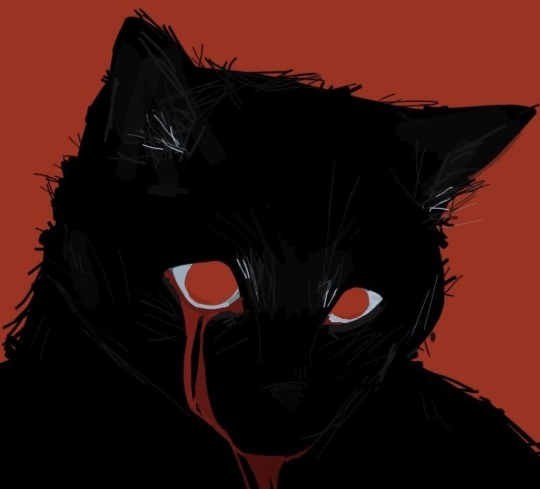
The Mask of Self-Delusion
(Jack C. June, 2024)
Edgar Allan Poe’s narrator in his short story, “The Black Cat,” is delusional. No reader would bat an eye at this claim, as that is very plainly the case upon even an elementary reading of the work. And yet, the reader is not a crucial part of the reading process itself. On the contrary, Poe’s narrator does not require a reader at all. Instead, the narrator is writing solely for himself. The unreliable narrator in Poe’s short story attempts to exonerate himself—to exculpate himself—in a confessional manner. From the very first lines, the reader becomes aware that they are not expected to believe the narrator, and because of this, the reader is not necessary in the first place. Instead, it is the narrator writing his story for himself in an attempt to justify and rationalize his vile actions—trying to clear away his wicked sins by claiming possession and demonic intervention. The themes of acting on evil human impulse and attempting to vindicate oneself through delusion are highlighted in Poe’s short story—allowing the reader to see that the devil is not necessary to perform vicious deeds—humans alone are just as capable.
It is evident from the first sentence that the narrator is not writing for an audience but for himself. The sentence reads, “For the most wild, yet homely narrative which I am about to pen, I neither expect nor solicit belief” (1). The reader is informed a moment later that the narrator is writing from a prison cell, and will die tomorrow, but first he wants to, “…unburthen [his] soul” (1). The narrator does not think anyone will believe him, but that does not matter to him. The narrator aims to assuage himself of the events that took place to convince himself that his actions were not entirely his own. This delusion becomes evident by the language used further in the first paragraph. For example, the narrator writes, “Yet, mad am I not…”, referring to the murders as a, “…series of mere household events”, and even going as far as to proclaim the events as, “…nothing more than an ordinary succession of very natural causes and effects” (1). The language is obviously filled with delusion, but the primary factor to take into account is the attempt at rationalizing his demonic behavior. The language may even remind readers of a defense attorney trying to subdue a tragedy at hand. The key word Poe uses to show the narrator’s attempted justification of his crimes is to describe them as “natural.”
As previously mentioned, this story does not require a reader. Whether or not anyone reads or believes the narrator is not the narrator’s main concern. Instead, the narrator only tries to convince himself of his innocence through delusion and self-manipulation. Scholars Vicki Hester and Emily Segir make an important point when they write, “The story cannot save him from the noose. He has no progeny and mentions no living relatives who might care about his guilt or innocence, so the story serves little purpose for the writer, leaving readers to wonder who might be the intended audience and what might be the story’s point” (176). The narrator is writing for himself—heightening his delusion in an effort to conceal himself from his wicked human nature. Therefore, it is vital that Poe chose to write his story in the first person and not the third. Had Poe written the story in the third person, readers would have been able to quickly identify that the narrator is unreliable. Similarly, the structure of the short story would lose its significance of being told as a confession had it been written in the third person. Poe cleverly chose to write “The Black Cat” in the first person to add to the obviousness of the narrator’s delusion, the vanquishing of pathos any reader may have for the narrator, and the glimpse into the psychologically disturbed that would have been lost otherwise.
This particular reading of the narrator attempting to vindicate himself is not a new interpretation. Scholar James Gorgano concurs with the specific reading of attempted self-exculpation, writing, “The narrator cannot understand that his assault upon another person derives from his own moral sickness and unbalance” (181). By accusing demonic entities and the supernatural, the narrator can step away from the blame he so clearly deserves. Gargano continues, writing, “Consequently, if his self-analysis is accepted, his responsibility for his evil life vanishes” (181). The narrator attempts to detach himself from his crimes by writing his story in his prison cell.
Further in the story, the narrator refers to being overcome by a demonic nature. Yet, he does little to consider that his “demonic nature” is actually innately human. One central theme for Poe is human nature being wicked at its core. Poe does not maintain the naïve belief of humans as innately good, but quite the opposite. Here, the narrator tries to trick himself into believing just that—that he is innocent and was influenced by outside powers. When the narrator kills his cat, he writes, “The fury of a demon instantly possessed me” (2). The narrator removes himself from the equation by casting blame on an evil force notorious for such a wicked crime. Further in the story, as the reader kills his wife, one sentence reads, “Goaded, by the interference, into a rage more than demonical, I withdrew my arm from her grasp and buried the axe in her brain” (6). The narrator has surpassed a demon's rage and arrived at the malicious doorstep of the devil’s capacity for wrath. The narrator cannot fathom that his human nature is not innately good and kind but devilish.
Finally, The narrator loses his grip on his sanity throughout the progression of the story. A few key indicators of the narrator becoming delusional have to do significantly with his language choice. Hester and Segir point out that, after the narrator kills his wife, “He now speaks of his wife as ‘it,’ ‘the body,’ ‘the corpse.’ He does not call his wife’s dead body an accident but refers to the death as, ‘the hideous murder accomplished’” (189). And again, there is a significant moment when the narrator casts his own blame onto otherworldly forces when discussing perverseness. These sentences read, “Yet I am not more sure that my soul lives, than I am that perverseness is one of the primitive impulses of the human heart—one of the indivisible primary faculties, or sentiments, which give direction to the character of Man” (2). The narrator craves to be absolved so intensely that he has no problem blaming his murders on human nature and demons—anyone but himself. Hester and Segir cleverly elaborate that, “He also suggests that we, readers, would all do the same, given the same circumstances” (179). A moment after the narrator blames perverseness, he writes, “Who has not, a hundred times, found himself committing a vile or a silly action, for no other reason than because he knows he should not?” (2). He carries on, speaking of his soul attempting to vex itself, committing, “…wrong for wrong’s sake only” (3). The narrator will do anything but look himself in the eye and confess that he, and he alone, is an evil man. The narrator would prefer to believe that all humans have a devil inside of them that may possess them at any moment and force them to commit heinous acts. It is easier to claim that, ‘the devil made me do it,’ than it is to look at one’s own blood-covered hands and have an epiphany of one’s Mephistophelian nature.
In the last paragraph, the narrator ceaselessly denies responsibility for his guilt. He writes, “Upon its head, with red extended mouth and solitary eye of fire, sat the hideous beast whose craft had seduced me into murder, and whose informing voice had consigned me to the hangman. I had walled the monster up within the tomb!” (8). He claims that Pluto had seduced him to kill instead of admitting that he did it of his own accord. What’s more, is that the narrator claims Pluto consigned him to the hangman—his impending death scheduled for the following day. The last line carries significant weight as the narrator directs—towards the cat—the word that should be used to describe himself—monster. On a deeper metaphorical level, this line can be read as the last act of attempted self-exculpation. With one last line, the narrator seals the guilt of his crimes within the wall. Maybe he was not referring to the cat as the monster, but the guilt of his crimes. The narrator of Edgar Allan Poe’s short story, “The Black Cat,” was never possessed by the devil, although he would prefer to think so. The narrator feels that if he can confess and convince himself of his innocence, he becomes blameless. Often, the devil is considered to be the root of all evil, but people forget that the first murder was a human killing a human—Cain killing Abel.
Works Cited
Gargano, James W. “The Question of Poe’s Narrators.” College English, vol. 25, no. 3, 1963, pp. 177–81. JSTOR.
Hester, Vicki, and Emily Segir. “Edgar Allan Poe: ‘The Black Cat,’ and Current Forensic Psychology.” The Edgar Allan Poe Review, vol. 15, no. 2, 2014, pp. 175–93. JSTOR.
Poe, Edgar Allan. “The Black Cat.” English ###: PDF File. The Black Cat.pdf, June, 2024.
#personal essay#college essay#essay#essay writing#my essays#edgar poe#edgar allan poe#Edgar Allan Poe the black cat#the black cat#black cat#cat#literary analysis#literary criticism#literature#american literature#gothic literature#goth#gothic#classic literature#literature major#literary quotes#study#research essay#english major#english literature#academia#uni#dark academia#chaotic academia#university
77 notes
·
View notes
Note
Do you know what's songs are associated with tadc showtime in both wonderland and tma au?
THANK YOU FOR ASKING!! *ahem*
I at first much rather yall to have your ideas and Headcannon on how their relationships are and what song fits, but for today I’ll treat ya.
For wonderland showtime, the song I say might fit would be Lets Misbehave:
youtube
I like to think like the poems from the book would jumble up the lyrics so it can be its own thing and be more nonsensical. But the song fits how talkative The Mad Chatter is, and how he usually jumps to the next topic.
Both find a fascination with each other that makes em click, and the way the singer says: “there’s something wild about you child that’s so contagious, let’s be outrageous, let’s misbehave” makes me chuckle imagining them dancing the lobster quadrille together.
—————————————————————————
The magnus circus au is an interesting topic onto itself to me. But the song that describes them is the song Villainous Thing:
youtube
I found out after seeing an analysis of the song; it’s about someone meeting a man that tells them to let loose and be that evil demon inside.
Caine wants Pomni to realize that she’s a monster and that all those deeds she calls good won’t justify what she truly is. “You’re a monster, so why lie to yourself even further?”
The lines in the lyrics fit so well, especially the line: “-cause you’re a villainous thing, and we can’t have you living a lie” that screams Tma Caine to me.
Please ask me for anymore tadc au ship songs, I’ve got plenty to spare hehehe 🤭
#the amazing digital circus#tadc#digital wonderland#tadc au#alice in wonderland#tadc caine#tadc pomni#tadc showtime#digital wonderland showtime#Tma#the magnus archives#Tma au#tadc x Tma#the carousel of eden#tma showtime#song suggestions#tadc ships
39 notes
·
View notes
Text
CHAOS THEORY SPOILER REVIEW
Cause I just finished it and I have thoughts!
Sooooo I honestly have mixed feelings about Chaos Theory if I’m going to be honest I feel like there are some things that worked in my opinion and some things that didn’t really work for me so I’ll be separating this review into three parts: Things I liked, Things I wasn’t a fan of, and General thoughts.
Things I liked:
-The animation was absolutely gorgeous, it was such a step up from Camp Cretaceous that it’s weird to think that they’re apart of the same series. The team behind it did an absolutely amazing job!
-The last two episodes. Oh my god were those last two episodes so good, they had me at the edge of my seat as well as episode 10 finally giving us interactions between the entirety of the nublar 5
-YASAMMY. I think yasammy was done so well this season. Their fight was so real, nobody was totally in the wrong, but they both weren’t communicating their feelings to each other well and they resolved it in the end. It was just perfect
-Yasmina Fadoula. She was written so well I loved how they didn’t just completely forget she has PTSD and anxiety and included that in her character arc for this season. I also loved how they used her to address how bad it is to infantilize those with mental disorders. (Yaz and I are anxiety twins 🧘♀️)
-Mateo. The GOAT. I am the number one Mateo fan, dont ever forget it. I love that man and I will stand by him, I was stressing for his life during episode 10.
-Microbang villain girl was such a menacing villain at the end and I honestly love her. It’s clear that while she is using the atrociraptors for evil deeds she does clearly care for them. I desperately need to know more about her…
-Kenji and Brooklynn’s new voice actors do such a good job with the characters and while I’ll miss Jenna and Ryan, their new voices were casted very well!
Things I wasn’t a big fan of:
-Now to address the elephant in the room…Darius being in love with Brooklynn. (I’m going to try to look at this through an objective pov, but since I don’t ship dinostar obviously there’ll be a slight bias)(nothing wrong if you do ship Dinostar I’m happy for you, but these are just my feelings) Im not a big fan of this. To me I’ve never really read Darius and Brooklynn as being romantic together and their friendship is something I truly cherished about JWCC. I do see why they probably decided to make the decision to have Darius be in love with Brooklynn, but to me it’s kind of upsetting in a way to have Darius’s extreme grief response not be just because they were best friends. It feels like the writers were saying “Well, he’s not experiencing this grief so hard because she was his best friend, but it’s actually because he loves her!”. We’ve seen loss be something Darius takes extremely hard (His dad’s death and Ben’s death) and so I don’t really see why they made it so he was in love with her to justify his response when it’s in character without it. Idk man…
-Brooklynn being alive….HEAR ME OUT HEAR ME OUT. THIS IS NOT BECAUSE I HATE BROOKLYNN SHES ACTUALLY ONE OF MY FAVORITE CHARACTERS. But idk these fake out deaths are starting getting to wear me down. Even Bumpy had a fake out death 😭. I get why they kept her alive being as she is a beloved character, but I just think it would’ve been better for her to be a character that somewhat haunts the narrative. It adds more onto the mystery, not only that but it allows the nublar five to explore “Hey our friend was hiding things from us and we’ll never truly get answers, but we’re going to find out what lead to her death and put a stop to it”. Which was what the nublar five are on a path to, until Brooklynn inevitably shows back up and explains everything. Also why did they give her the 2017 Katy Perry haircut…
-Kenji and Darius’s dynamic. I loved how they used their dynamic at the beginning of the show with Kenji blaming Darius for Brooklynn’s death, but beyond that moment their dynamic felt off to me. It was not helped by the whole Darius being in love with Brooklynn thing, but it just felt like they toned down their brotherly bond in this show (ironic since this is the first time we see them call themselves brothers)
General thoughts
-Jesus Christ was Kenji this shows punching bag 😭. He literally does not get a break, it just keeps on coming, breaking up with his girlfriend because she’s not invested in their relationship anymore, living in a trailer with a failing rock climbing business, his girlfriend kept secrets from him all while working with his estranged dad behind his back, his dad trying to use him again and then dying saving him, AND his brother was in love with his ex girlfriend. All in the span of ten episodes. If I was him I would have a mental breakdown every single day.
-Do yall think Ben actually has a girlfriend? I’m like at a 70/40 split, because he only talks about her two times and the first time he brings her up she totally sounds fake. “She’s from…Europe” Why did you have to think so much Benjamin? Also he fully just said she’s from the continent of Europe rather than a specific country in Europe. Also also it’s implied he hasn’t had a phone on him for a while so how does a long distance relationship work if he doesn’t have any means to contact her??? And he doesn’t even have a picture of her in his van. That man is hiding something I need to know…
-Ben and Darius had like 30-40 minutes of screen time shared between them, which is weird because like most of the show was marketed with them being the main protags and they barely interact beyond episode 4. (Their dynamic was too strong for people to handle “do you talk to your mother with that mouth” broke the world)
-Bumpy having a baby is something I predicted and I’m happy I was right!
Anyway that’s really it, sorry this was pretty long and excuse any typos or grammatical errors, but these were just some of my thoughts!
#jwct spoilers#chaos theory spoilers#jwcc#jwct#camp cretaceous#chaos theory#jurassic world camp cretaceous#jurassic world chaos theory#ben pincus#darius bowman#yasmina fadoula#sammy gutierrez#kenji kon#brooklyn jwcc#mor posts
88 notes
·
View notes
Text
Why Villains Are Great
I can sum that up with one beautiful word… Versatility
For you see…

A villain can either be a someone who willingly threw away their humanity to become something monstrous…
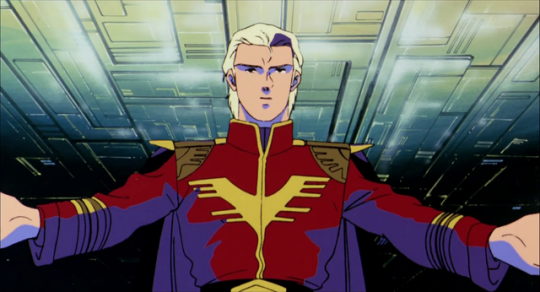
Or they’re someone who retains their parts of their humanity, while still committing the most heinous of deeds.

They could be a demon trying to force their twisted sense of order upon everyone from atop an ivory tower…
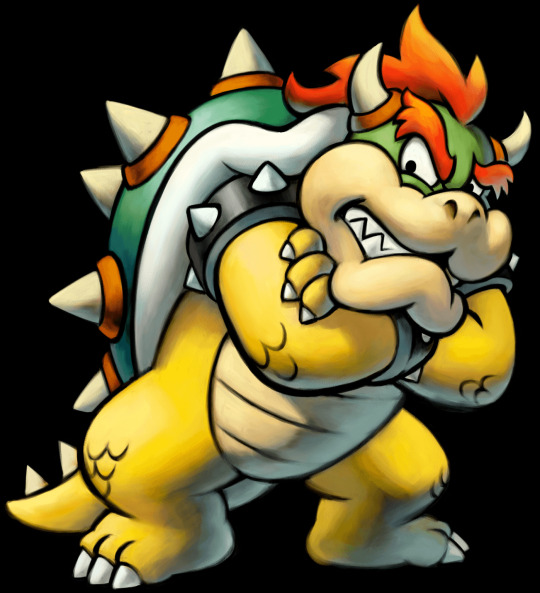
Or just a plain bully with a soft spot that shows itself more often as time flies.

They can have the purest of intentions and cause mass suffering at the same time…

Or they are a self-righteous narcissist who sees their horrendous actions as completely justified and in the right.

Maybe they’re an ethereal, destructive, carless, and otherworldly entity…

Or a truly tragic monster.

It doesn’t matter if they’re a man…

Or a beast…

A villain can be anything or anyone, for evil has many shapes and many faces.
#Villains#ganondorf#calamity ganon#ganon#sephiroth#Hades#hades kid icarus#ghetsis#edelgard von hresvelg#bowser#sauron#char aznable#dio brando#the legend of zelda#legend of zelda#final fantasy#ff7#kid icarus uprising#kid icarus#pokemon#fire emblem#lord of the rings#tolkien#mobile suit gundam#gundam#jojo's bizarre adventure#jjba#(one behind the mask) mun izunia#ramblings
344 notes
·
View notes